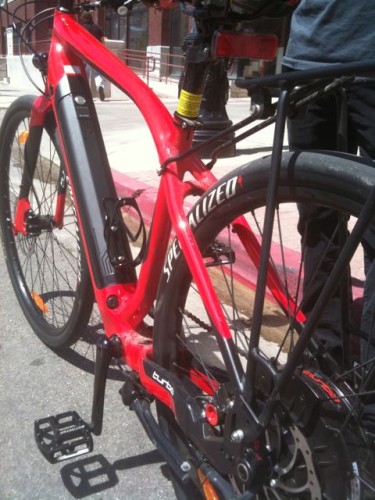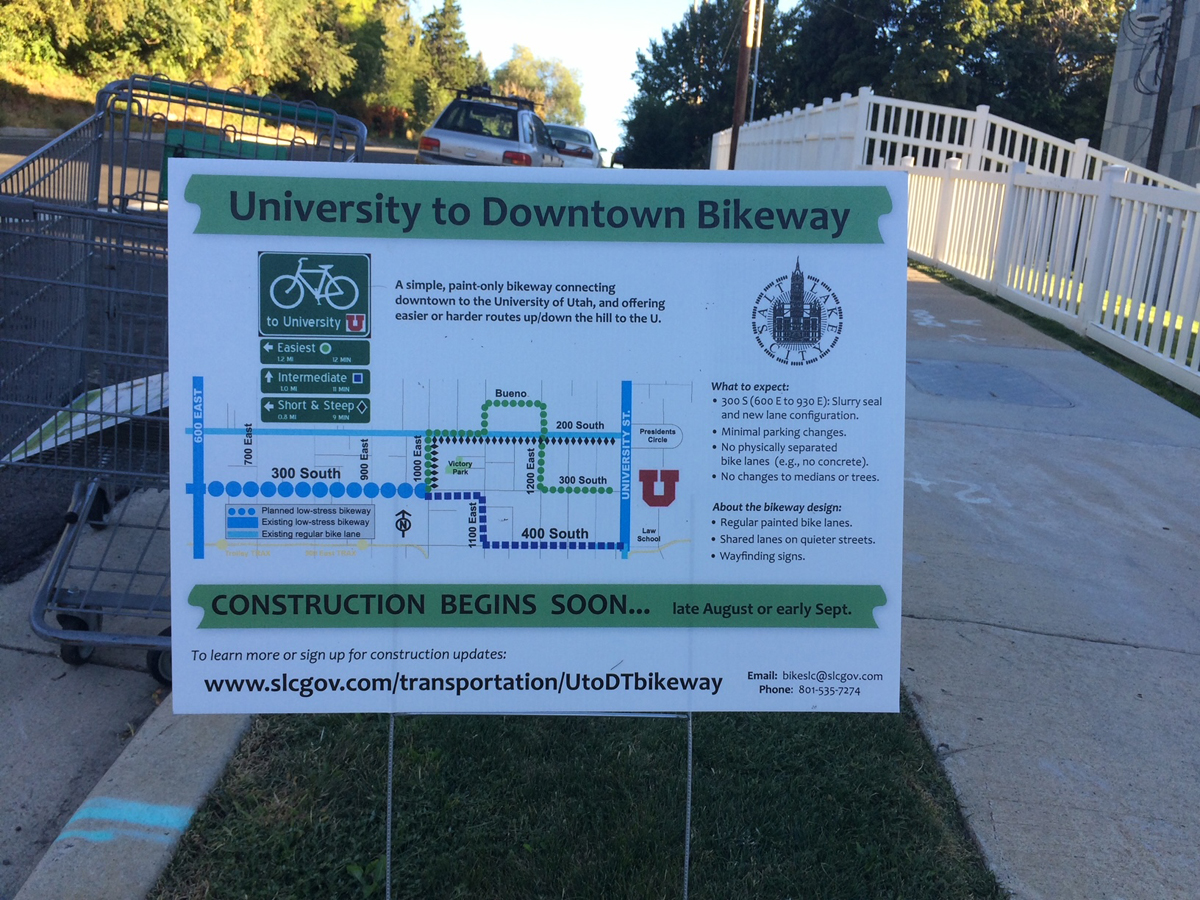
February 15, 2016 – Utah Senate Bill 121, sponsored by Sen. Todd Weiler (R-Woods Cross), aims to fix some issues with Utah’s code regarding electric bicycles. Currently, under Utah’s traffic code, an electric assisted bicycle operator is required to have a driver’s license. This was an inadvertent requirement that occurred when the code was last updated. The bill would also potentially allow e-bikes on trails, including mountain bike trails. The bill passed out of committee last week and is on its way to the Senate floor.
The key part of the new law is below and redefines an electric assisted bicycle:
(13) “Electric assisted bicycle” [means a moped] means a bicycle with an electric
85 motor that:
86 (a) [with an electric motor with] has a power output of not more than 1,000 watts;
87 [and]
88 (b) [which] is not capable of:
89 (i) [propelling the device] traveling at a speed of more than 20 miles per hour on level
90 ground when:
91 (A) powered solely by the electric motor; and
92 (B) operated by a person who weighs 170 pounds; and
93 [(ii) increasing the speed of the device when human power is used to propel the device
94 at more than 20 miles per hour;]
95 (ii) traveling at a speed of more than 28 miles per hour on level ground when powered
96 simultaneously by the electric motor and an operator who weighs 170 pounds;
97 (c) has fully operable pedals on permanently affixed cranks; and
98 [(d) weighs less than 75 pounds.]
99 (d) is fully operable as a bicycle without the use of the electric motor.
This will mean that electric bicycle operators will no longer have to have a driver’s license to ride an electric bike.
The bill also adds that electric bicycle operators will be governed by the law for bicyclists:
Section 2. Section 41-6a-1115.5 is enacted to read:
360 41-6a-1115.5.Electric assisted bicycles — Restrictions — Penalties.
361 (1) Except as otherwise provided in this section, an electric assisted bicycle is subject
362 to the provisions under this chapter for a bicycle.
363 (2) An individual under 15 years of age may not operate an electric assisted bicycle
364 with the electric motor engaged on any public property, highway, path, or sidewalk unless the
365 individual is under the direct supervision of the individual’s parent or guardian.
366 (3) An individual under eight years of age may not operate an electric assisted bicycle
367 with the electric motor engaged on any public property, highway, path, or sidewalk.
368 (4) The owner of an electric assisted bicycle may not authorize or knowingly permit an
369 individual to operate an electric assisted bicycle in violation of this section.
370 (5) An individual who violates this section is guilty of an infraction.
And, it clarifies that electric bike operators won’t need a driver’s license:
(c) A person operating an electric assisted bicycle, as defined in Section 41-6a-102, is
416 not required to have a valid class D driver license or a motorcycle endorsement issued under
417 this chapter.
Lastly, it allows electric bicycles on recreational trails:
(4) “Recreational trail” or “trail” means a multi-use path used for:
431 (a) muscle-powered activities, including:
432 (i) bicycling;
433 (ii) cross-country skiing;
434 (iii) walking;
435 (iv) jogging; and
436 (v) horseback riding; and
437 (b) uses compatible with the uses described in Subsection (4)(a), including the use of
438 an electric assisted bicycle, as defined in Section 41-6a-102.
To comment on the bill, citizens can email their legislator at http://le.utah.gov/
Analysis and Commentary:
From our reading of the bill, this will fix the issue of requiring electric bike operators to have driver’s licenses. This was little known in the bike community, and was an unintended consequence of the last amendment of the code in 2015. With the rise of electric bikes, many issues like this are bound to arise as law is created to govern their operation.
One Cycling Utah reader brought to our attention the issue that children 15 and under will not be able to operate an electric bike without direct parental supervision. They felt that this was overreach.
Utah’s approach to the law is simpler than California new code that was passed in 2015. In California, 3 different types of electric bikes are defined – 1. Pedal operated, speeds up to 20 mph. 2. Not pedal operated, speeds up to 20 mph. 3. Pedal operated, speeds up to 28 mph.
California’s law has age restrictions only on category 3 electric bikes – 16 and up.
Utah puts everything pedal operated into one category, thus simplifying the law. This however means that slower speed electric bikes will not be allowed for children 15 and under.
Electric Bikes and Insurance?
It’s not clear if insurance would be required for electric bikes or not. Likely it would not be since bicyclists are not required to carry insurance. (However, it’s a good idea for bicyclists to have maximum underinsured/uninsured motorist coverage on their auto policy as well as higher levels for Personal Injury Protection).
Electric Bikes on Trails?
Another apparent consequence of the new law is that e-bikes would be allowed on trails. While there hasn’t been much debate regarding e-bikes on hard-surfaced trails such as the Jordan River Parkway, there has been a lot of discussion on e-bikes on mountain bike trails.
Moab’s BLM office classifies electric bikes as motorized vehicles and doesn’t allow them on trails designated for non-motorized use. Since BLM trails are on Federal property, the BLM rule would stand.
In Park City, a pilot program on e-bikes was established in 2015. It allows e-bikes on certain multi-use trails, and bans them on others (Rail Trail and the Farm Trail). Additionally, e-bikes are banned on all natural surface trails within city limits.
It’s unclear whether the new code would override Park City’s pilot program and allow e-bikes on all multi-use trails as well as mountain bike trails. In our view, the bill needs to clarify both whether local governments can keep e-bikes off of paved trails, as well as soft-surfaced trails. It’s also unclear to us whether the definition of ‘recreational trails’ in the code applies to natural surfaced trails (i.e. mountain bike trails). If so, it would allow electric bikes on mountain bike trails. If not, it would certainly allow electric bikes on hard surfaced trails.
With the proliferation of electric bikes, the issue of whether or not they should be allowed on mountain bike trails is far from settled, with strong opinions on both sides.
Cycling Utah invites readers to weigh-in in the comments below.











I have been a long time resident of Utah and have enjoyed the outdoors for 56 years. As I have looked at the laws for all electric bikes, I am amazed at why they need to restrict for the most part, good healthy individual and family activities in utah that have minimal negative effects. I am amazed that states like California can Over restrict there citizens, which reduce there quality of life. Yet I was impressed about California’s laws concerning electric bikes. Simple classifications of 1, 2, and 3 that really seem to cover all manufactured electric bikes and basic safety laws allowing the use of public lands, roads, paths and trails. In areas that can increase danger to life and environment should be left to the local communities to pass reasonable restrictions only and not to larger Governments that think they know what localized areas or communities need. Allow citizens the opportunity to Govern themselves before enacting laws. As dangers evolve, than governments should carefully and respectfully encourage there citizens to come up with ideas to support the enactment of any law.
I just encountered an E-tricycle today. I have never heard of nor seen one before but it seems the ideal choice for me. I can’t find anything that references laws/ requirements about them.
I want one. It has a driver’s seat for me, a backseat for my service dog and a small trunk for my groceries, etc.
Do you have any insight?
Comments are closed.